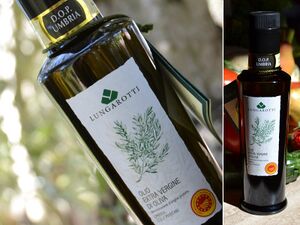Umbria (Umbria olive oil)

DOP Umbria is an Italian extra virgin olive oil with the following chemical and organoleptic characteristics:
- Acidity: max. 0.65%
- Peroxides: < 12 Meq 02/kg
- Total polyphenols: > 100 ppm
- Colour: green to yellow
- Aroma: medium fruity
- Flavour: fruity, with a hint of pungent and bitter flavour
The above values vary, although within very strict limits, for each of the geographic indications permitted. Other chemical-physical parameters are in conformity with current EU regulations.
GEOGRAPHICAL AREA:
The production area of "Umbria" controlled designation of origin oil includes the administrative area of the Region of Umbria.
EVIDENCE OF ORIGIN:
The tradition of olive-growing in Umbria is ancient. The earliest archaeological findings go back to the first century B.C. Many remains of oil mills and leather bottles are found here and there in the communes of Amelia, Montefalco and Terni. Over the centuries olive-growing has gone through many different periods, and now it has become an important crop for the Region's economy, especially for the flow of trade it generates. The marketing of Umbrian oil today follows two main channels: that of internal consumption, and that of being sold as a high quality product.
ACQUISITION:
DOP Umbria extra virgin olive oil is produced from healthy olives, harvested by January 15. The per hectare yield of olives may not exceed 6,500 Kg/ha in the specialized olive groves, with a maximum oil yield of 21%. The only extraction methods permitted are those physical and mechanical processes suitable for producing oils which preserve as faithfully as possible the particular and original characteristics of the fruit.
LINK:
Olive-growing is one of the main production sectors in the Region, and has a prominent role in the area's economy, especially for the commercial implications taken on by the Region's production of quality oils. Olive-growing in Umbria is done almost exclusively in hilly areas, making it difficult to use machinery. This gives the human factor a determining role in the obtaining of the special quality of Umbrian oil, especially during harvesting, which takes place very early. To better protect and defend Umbrian oil production, since 1986 the Region of Umbria has promoted and supported the creation of the CO.RE.OL - Consorzio per l'olio extravergine d'oliva (Extra Virgin, Olive Oil Consortium). Although Umbria is a region having a limited global surface (two administrative departments only), it has a highly specific territorial and cultural character. As concerns DOP Umbria qualitative expression, Umbria territory shows five different geographical indications, in order to better describe the geographical localisation of the specific organoleptic characters of Umbria olive oil. These are the following: "Umbria-Colli Assisi-Spoleto", "Umbria Colli Martani", "Umbria Colli Amerini", "Umbria Colli del Trasimeno", "Umbria Colli Orvietani". These geographical differences are linked to the importance of human factors in the cultivation, which have different characters in the different regions of Umbria. In fact, as the cultivation areas lie very often in the hills, it is not always possible to use mechanic techniques. These differences are also justified by the need for protecting the territorial characters that help diffusing, within the region, the reputation and - the commercial success of Umbria olive oil.
GASTRONOMY:
Extra virgin olive oil is highly perishable and must be stored correctly in order to maintain its organoleptic characteristics. It should therefore be kept in a cool, dark place at a temperature between 14 and 18°C, away from heat sources and other foods that release odours. It should be consumed within four to six months of pressing to fully appreciate its qualities. DOP Umbria extra virgin olive oil has an intense flavour and fragrant aroma, making it an ideal condiment for either very flavoured or simple dishes.
Reference: The European Commission
#extravirginoliveoil #olive #oliveoil #dipsandsauces #italian #storecupboarditems #olives #condiments #oils #fruit